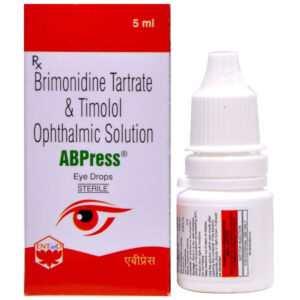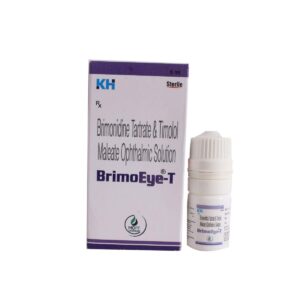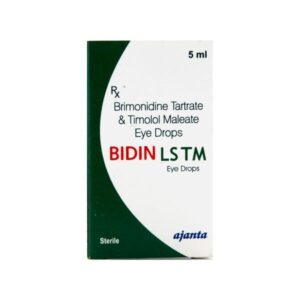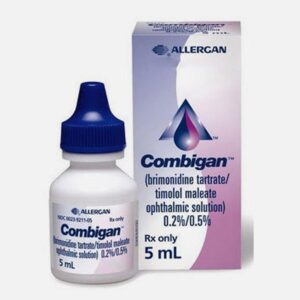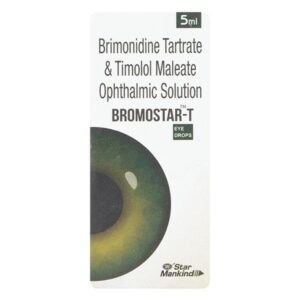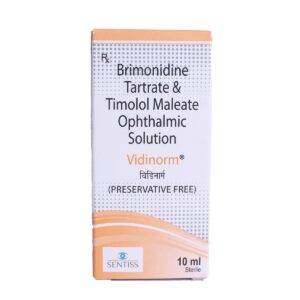BRIMONIDINE + TIMOLOL
Brimonidine: Brimonidine is a medication commonly used to treat eye conditions such as glaucoma and ocular hypertension. It is marketed under brand names such as Alphagan and Lumify.
Mechanism of Action:
Brimonidine belongs to the class of medications called alpha-2 adrenergic receptor agonists. It works by reducing the production of aqueous humor (the fluid inside the eye) and increasing the outflow of fluid from the eye. This helps to lower the pressure inside the eye, which is beneficial in treating glaucoma and ocular hypertension.
Use:
Brimonidine is primarily used for the treatment of open-angle glaucoma or ocular hypertension, conditions characterized by increased pressure in the eye. It may be prescribed as the first-line treatment or in combination with other eye drops to help control intraocular pressure (IOP). Lumify, a lower concentration version of brimonidine, is also used for temporary relief of redness in the eyes.
Dose:
The typical recommended dose for adults is one drop of brimonidine 0.2% or 0.15% solution in the affected eye(s) three times a day. The strength and dosage frequency may vary depending on the individual’s condition and the doctor’s recommendation. It is important to follow the instructions provided by the healthcare professional.
Side Effects:
Like any medication, brimonidine can cause side effects. Common side effects include:
1. Ocular side effects: Eye redness, burning or stinging sensation, itching or allergic conjunctivitis, blurred vision, dryness or discomfort in the eyes, and tearing.
2. Systemic side effects: Dry mouth, dizziness, fatigue, headache, sleepiness, and changes in taste.
It is worth noting that serious allergic reactions to this medication are rare but possible. If any severe allergic reactions occur, such as swelling of the face or throat or difficulty breathing, immediate medical attention should be sought.
It is important to inform your doctor of any pre-existing medical conditions or medications you are taking before starting brimonidine to ensure its safe use and avoid potential drug interactions.
Timolol: Timolol is a medication primarily used to treat high blood pressure, glaucoma, and to prevent migraines. It belongs to a class of drugs called beta-blockers.
The primary mechanism of action of timolol is by blocking the beta-adrenergic receptors in the body. By doing so, it reduces the effects of adrenaline and other stress hormones, resulting in a decrease in heart rate, blood pressure, and intraocular pressure.
For high blood pressure, the usual starting dose of oral timolol is 10 mg taken once or twice daily. The dosage may be adjusted based on individual response, but the maximum recommended dose should not exceed 60 mg per day.
For the treatment of glaucoma, timolol is available as eye drops. The usual recommended dose is one drop in the affected eye(s) once or twice daily. The frequency and dose may vary depending on the severity and response to treatment.
Common side effects of timolol include dizziness, tiredness, slow heart rate, low blood pressure, shortness of breath, and cold hands or feet. It may also cause eye-related side effects such as burning, stinging, redness, or blurred vision when used as eye drops.
Serious side effects, although rare, may include a worsening of heart failure symptoms, worsening bronchospasm in individuals with asthma or chronic obstructive pulmonary disease (COPD), and hypersensitivity reactions such as rash or difficulty breathing. It is important to inform your healthcare provider about any pre-existing medical conditions or medications you are taking to ensure the safe and appropriate use of timolol.
As with any medication, it is advisable to consult a healthcare professional for guidance on the appropriate use, dosage, and possible interactions or contraindications with other medications.


